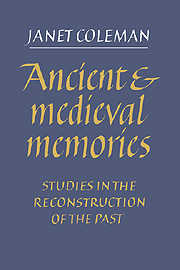Book contents
- Frontmatter
- Contents
- Preface
- List of abbreviations
- PART I THE CRITICAL TEXTS OF ANTIQUITY
- Introduction
- 1 Plato
- 2 Aristotle
- 3 Cicero
- 4 Pliny and Roman naturalists on memory; Borges's Funes the Memorious
- 5 Plotinus and the early neo-Platonists on memory and mind
- 6 Augustine: the early works
- 7 Augustine's De Trinitate; on memory, time and the presentness of the past
- PART II THE PRACTICE OF MEMORY DURING THE PERIOD OF TRANSITION FROM CLASSICAL ANTIQUITY TO THE CHRISTIAN MONASTIC CENTURIES
- Introduction
- PART III THE BEGINNINGS OF THE SCHOLASTIC UNDERSTANDING OF MEMORY
- Introduction
- PART IV ARISTOTLE NEO-PLATONISED: THE REVIVAL OF ARISTOTLE AND THE DEVELOPMENT OF SCHOLASTIC THEORIES OF MEMORY
- Introduction
- PART V LATER MEDIEVAL THEORIES OF MEMORY: THE VIA ANTIQUA AND THE VIA MODERNA.
- Introduction
- Conclusion: an all too brief account of modern theories of mind and remembering
- Bibliography
- Index
1 - Plato
Plato on memory; his theory of mind, learning, recalling, knowing. ‘Meno’, ‘Phaedrus, Republic’.
Published online by Cambridge University Press: 06 January 2010
- Frontmatter
- Contents
- Preface
- List of abbreviations
- PART I THE CRITICAL TEXTS OF ANTIQUITY
- Introduction
- 1 Plato
- 2 Aristotle
- 3 Cicero
- 4 Pliny and Roman naturalists on memory; Borges's Funes the Memorious
- 5 Plotinus and the early neo-Platonists on memory and mind
- 6 Augustine: the early works
- 7 Augustine's De Trinitate; on memory, time and the presentness of the past
- PART II THE PRACTICE OF MEMORY DURING THE PERIOD OF TRANSITION FROM CLASSICAL ANTIQUITY TO THE CHRISTIAN MONASTIC CENTURIES
- Introduction
- PART III THE BEGINNINGS OF THE SCHOLASTIC UNDERSTANDING OF MEMORY
- Introduction
- PART IV ARISTOTLE NEO-PLATONISED: THE REVIVAL OF ARISTOTLE AND THE DEVELOPMENT OF SCHOLASTIC THEORIES OF MEMORY
- Introduction
- PART V LATER MEDIEVAL THEORIES OF MEMORY: THE VIA ANTIQUA AND THE VIA MODERNA.
- Introduction
- Conclusion: an all too brief account of modern theories of mind and remembering
- Bibliography
- Index
Summary
Plato's Meno, a middle-period dialogue which is thought to report a conversation that took place in the newly restored democracy in Athens of 402 bc, sets out a theory of knowledge as recollection. The wealthy Meno raises the sophistic dilemma about knowledge, that one can never find out anything new so that either one knows it already and one has no need to find it out, or else one does not know and there is no means of recognising it when found. ‘How will you look for something when you do not in the least know what it is? How on earth are you going to set up something you don't know as the object of your search? Even if you come right up against it, how will you know that what you have found is the thing you did not know?’ (80 D). Socrates tries to answer this question of how it is possible to inquire into anything unknown by attempting to elucidate the nature of knowledge, inquiry and reality. He propounds his theory that knowledge is recollection, rather than something imparted by teaching, basing it on the religious doctrine that the human soul is immortal. Instead of perishing at the body's death, the soul migrates elsewhere and is thereafter born in a new body.
- Type
- Chapter
- Information
- Ancient and Medieval MemoriesStudies in the Reconstruction of the Past, pp. 5 - 14Publisher: Cambridge University PressPrint publication year: 1992

